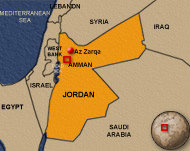US eases control on Mideast visitors
The US government has said it was scrapping a controversial control on foreign visitors, mainly men from the Middle East, introduced after the 11 September, 2001 attacks.

The Department of Homeland Security said resources could be better used in the “war on terrorism”.
With immediate effect, men from 25 nations, who will still be photographed and fingerprinted on arrival, will no longer have to re-register after 30 days and then one year after entering America.
Asa Hutchinson, Homeland Security’s undersecretary for border and transportation security, said the move freed up resources to target more effectively potential terrorists based on individual and not geographic factors.
“It was a significant resource commitment to handle these re-registrations,” Hutchinson told reporters. “The resources can be better used in individual targeting.”
Re-registration had only minimal benefits in terms of national security, Hutchinson said, adding officials never received any national security “leads” from re-registration.
Critics accused the government of unfairly targeting thousands of people on grounds of nationality. The registration programme, like other measures implemented in the wake of the Sept. 11 attacks, was also attacked for being intrusive.
Scrapping welcomed
The Council on American-Islamic Relations, a Washington-based human rights group, welcomed the scrapping of registration requirements.
|
“The resources can be better used in individual targeting” |
“Any new screening procedures should not be based on religion, ethnicity or national origin, but instead reflect the American values of equal justice and religious freedom,” the group’s executive director Nihad Awad said in a statement.
Under the original programme, males 16 years or older and nationals of the 25 countries had to be fingerprinted and photographed at the border. They had to re-register 30 days later and on the year’s anniversary of original registration.
Border registration
Now, males from the 25 countries will undergo special border registration but will not have to re-register.
When it launched the programme in 2002, the Justice Department claimed the countries selected were places where Usama bin Ladin’s al-Qaida network or other groups had been active, or where the United States had national security concerns.
|
|
|
Most Middle Eastern countries |
The countries affected were Afghanistan, Algeria, Bahrain, Bangladesh, Egypt, Eritrea, Indonesia, Iran, Iraq, Jordan, Kuwait, Libya, Lebanon, Morocco, North Korea, Oman, Pakistan, Qatar, Somalia, Saudi Arabia, Sudan, Syria, Tunisia, United Arab Emirates and Yemen.
Homeland Security inherited the programme when the department was created earlier this year.
New rules
The new rules give Homeland Security the right to select men from those 25 nations for further interviews, but it is done on an individual basis based on specific information.
Under the old rules, about 82,000 visitors would be required to report in the next five months for either their 30-day or annual re-registration, Hutchinson said. Those people no longer have to re-register.
More than 290,000 registrations were reported through 30 September and 2870 people were detained as a result of registrations – mostly for being in violation of immigration laws – with 23 people still in custody, Hutchinson said.
